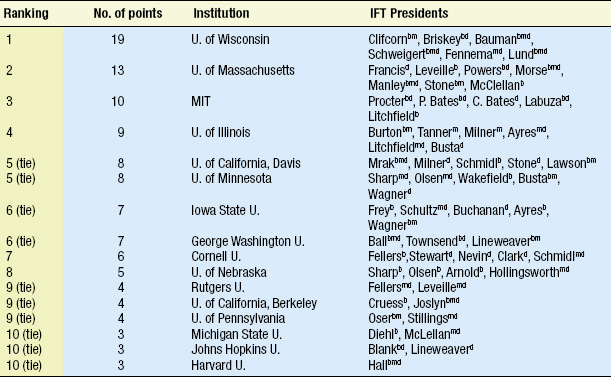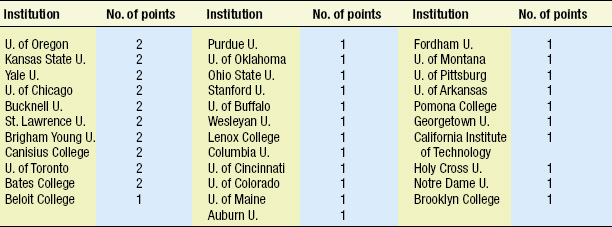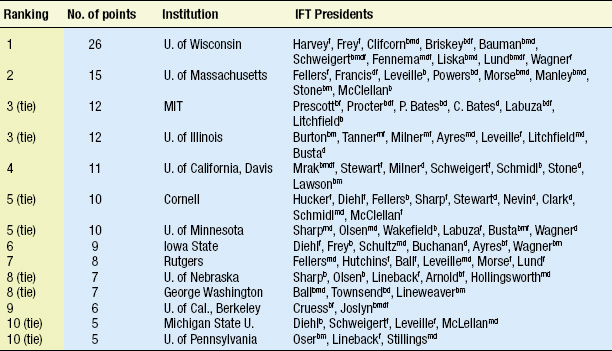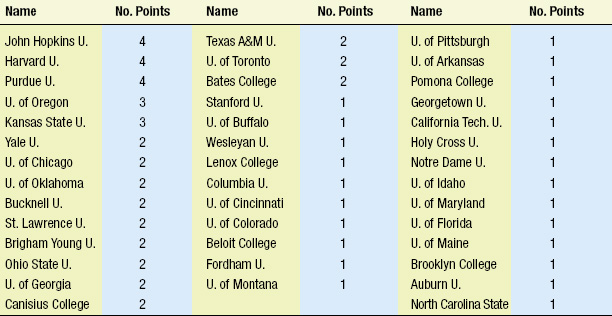Influence of Educational Institutions on the IFT Presidency
Four universities have produced the most presidents of the Institute of Food Technologists.
The Institute of Food Technologists, in the 65 years of its existence, has gained a deserved reputation for the geographic diversity of its presidents. In an effort to see which educational institutions have produced the most IFT presidents, I assigned numerical values to the presidents’ academic degrees.
I gave one point for each degree, as designated in the tables by the superscripts b, m, and d, for bachelor’s, master’s, and doctorate, respectively. Admittedly, this is an arbitrary classification, since there are many other forms of education.
 Rankings by Education
Rankings by Education
Table 1 shows the results. The top four universities—i.e., the universities which have produced the most IFT presidents—are the U. of Wisconsin with 19 points, the U. of Massachusetts with 13 points, the Massachusetts Institute of Technology with 10 points, and the U. of Illinois with 9 points. Twelve others follow with points ranging from 8 to 3. Table 2 lists 33 other institutions with points ranging from 2 to 1; these reflect primarily the diversity of individuals who enter the profession.
 The rankings reflect to some degree the evolution of IFT, since two universities in the top ranks—MIT and the U. of California, Berkeley—are no longer prominent in the food technology profession. The program at MIT was discontinued in 1987, and the program at Berkeley was transferred to Davis after World War II.
The rankings reflect to some degree the evolution of IFT, since two universities in the top ranks—MIT and the U. of California, Berkeley—are no longer prominent in the food technology profession. The program at MIT was discontinued in 1987, and the program at Berkeley was transferred to Davis after World War II.
Influence of Faculty Positions
When additional points are given for faculty positions at universities (indicated by the superscript f), the results change slightly. For example, David Lineback accumulated 6 additional points for holding or having held faculty positions at North Carolina State U., U. of Nebraska, Kansas State U., Pennsylvania State U., U. of Idaho, and U. of Maryland.
 Table 3 shows the institutions with the most points. As shown, the rankings of the top four universities remains the same, although the number of points of course change. The U. of Wisconsin has 26 points, and the U. of Massachusetts has 15 points. MIT and the U. of Illinois are tied for third place with 12 points, and the U. of California, Davis is fifth with 11 points. Eight more are clustered between 5 and 10 points. Table 4 shows 41 additional institutions with points ranging from 4 to 1.
Table 3 shows the institutions with the most points. As shown, the rankings of the top four universities remains the same, although the number of points of course change. The U. of Wisconsin has 26 points, and the U. of Massachusetts has 15 points. MIT and the U. of Illinois are tied for third place with 12 points, and the U. of California, Davis is fifth with 11 points. Eight more are clustered between 5 and 10 points. Table 4 shows 41 additional institutions with points ranging from 4 to 1.
 Gender Diversity
Gender Diversity
Recent years have also shown the diversity of IFT presidents with respect to gender. Mary Wagner (1997–98) was the first female president, followed by Mary Schmidl (2000–01), Ann Hollingsworth (2002–03), and Margaret Lawson (2005–06). This is an encouraging trend. The IFT is in good hands, and the future looks great.
by F.J. Francis The author, a Fellow and Past President of IFT, is Emeritus Professor of Food Science, University of Massachusetts, Amherst, MA 01003, [email protected].
--- PAGE BREAK ---
IFT’S PRESIDENTS, 1939–2006
Samuel C. Prescott, 1939–41
Laurence V. Burton, 1941–42
Roy C. Newton, 1942–43
William V. Cruess, 1943–44
Fred C. Blanck, 1944–45
Fred W. Tanner, 1945–46
Ellery H. Harvey, 1946–47
George J. Hucker, 1947–48
H.C. Diehl, 1948–49
Carl R. Fellers, 1949–50
Paul F. Sharp, 1950–51
Charles N. Frey, 1951–52
Bernard E. Proctor, 1952–53
Berton S. Clark, 1953–54
Phillip K. Bates, 1954–55
LaVerne E. Clifcorn, 1955–56
George F. Garnatz, 1956–57
Emil M. Mrak, 1957–58
Aksel G. Olsen, 1958–59
Ray B. Wakefield, 1959–60
Imri J. Hutchings, 1960–61
Harold W. Schultz, 1962–62
John M. Jackson, 1962–63
C. Olin Ball, 1963–64
Charles T. Townsend, 1964–65
Maynard A. Joslyn, 1965–66
John H. Nair, 1966–67
George F. Stewart, 1967–68
Bernard L. Oser, 1968–69
Herbert E. Robinson, 1969–70
Hans Lineweaver, 1970–71
Richard L. Hall, 1971–72
Ben F. Buchanan, 1972–73
Reid T. Milner, 1973–74
Charles F. Niven Jr., 1974–75
Ernest J. Briskey, 1975–76
John C. Ayres, 1976–77
Howard E. Bauman, 1977–78
Bernard S. Schweigert, 1978–79
Walter L. Clark, 1979–80
Frederick J. Francis, 1980–81
Arthur T. Schramm, 1981–82
Owen R. Fennema, 1982–83
Gilbert A. Leveille, 1983–84
Bernard J. Liska, 1984–85
Charles J. Bates, 1985–86
John J. Powers, 1986–87
Roy E. Morse, 1987–88
Theodore P. Labuza, 1988–89
Paul F. Hopper, 1989–90
Daryl B. Lund, 1990–91
John H. Litchfield, 1991–92
David R. Lineback, 1992–93
Al S. Clausi, 1993–94
Roy G. Arnold, 1994–95
Frank F. Busta, 1995–96
Robert E. Smith, 1996–97
Mary K. Wagner, 1997–98
Bruce R. Stillings, 1998–99
Charles H. Manley, 1999–2000
Mary K. Schmidl, 2000–01
Philip E. Nelson, 2001–02
Mark R. McLellan, 2002–03
C. Ann Hollingsworth, 2003–04
Herbert Stone, 2004–05
Margaret A. Lawson, 2005–06
